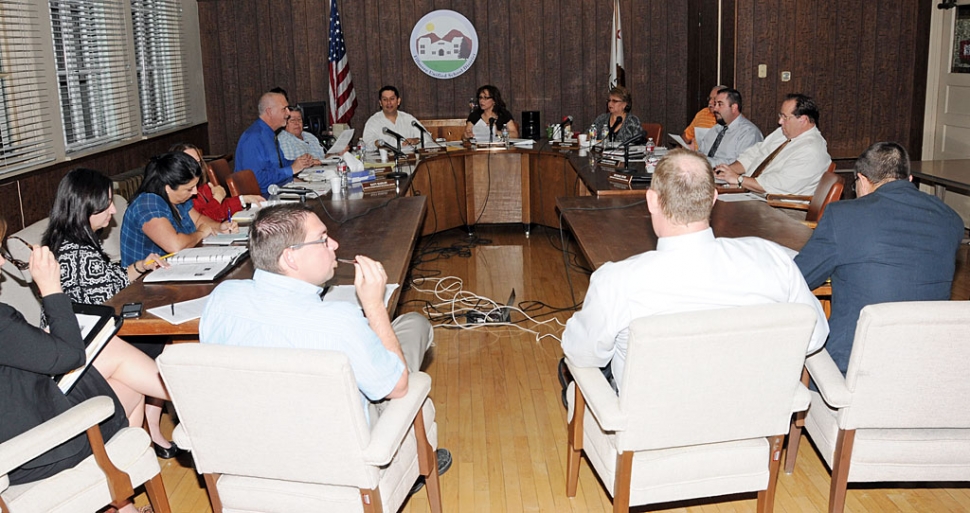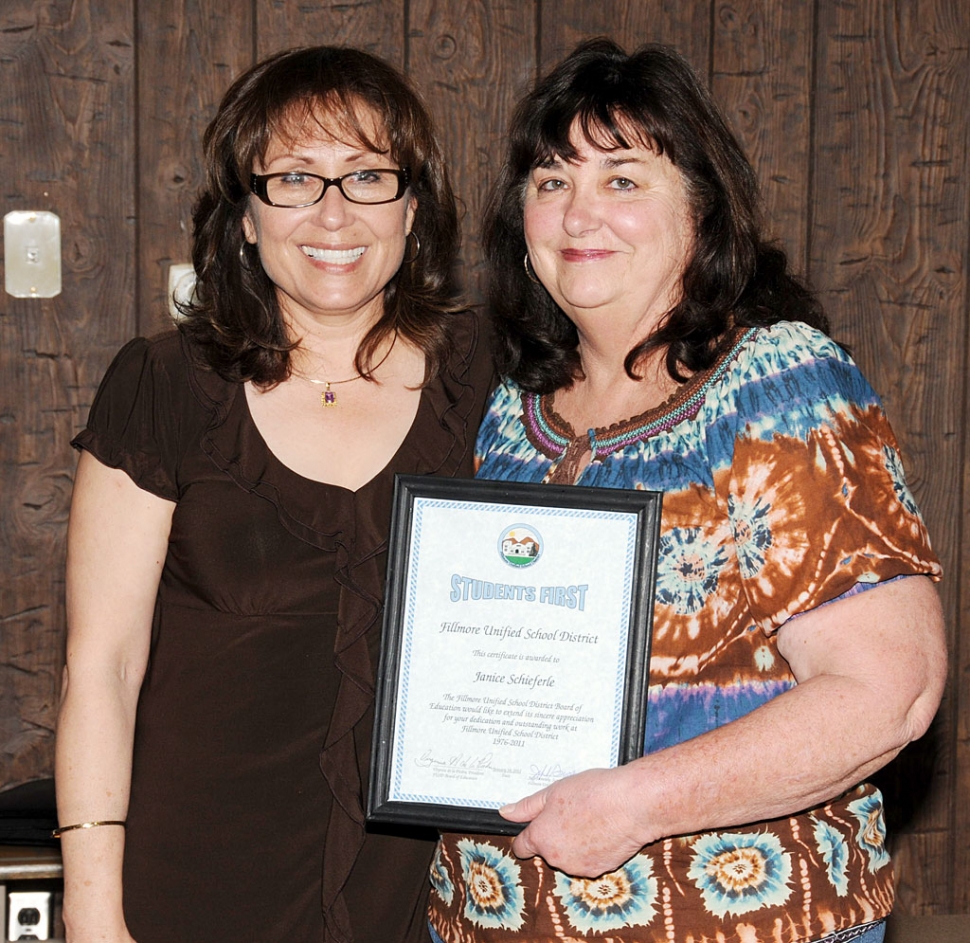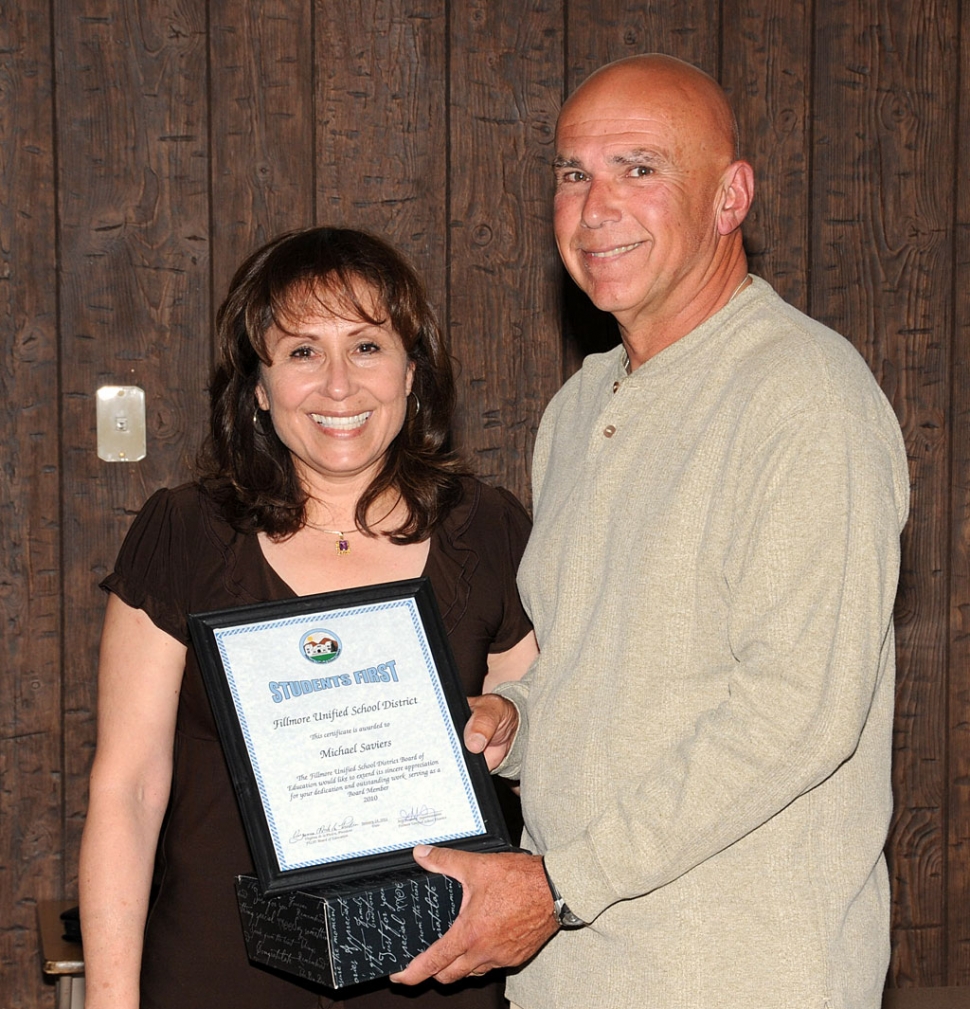|
Study Sessions and More Budget Woes
 Fillmore Unified School Board met for the first of several Study Sessions on the district's PI (Program Improvement) status. By Kimberly Rivers — Wednesday, January 19th, 2011
 (l-r) Board Member Virginia De La Piedra and Janice Schieferle who received a “Students First” award in recognition of her 35 years of service to the District.  (l-r) Virginia De La Piedra presents former Board Member Michael Saviers a ‘Students First’ award in recognition of his brief but important time served on the Board.  During public comment last night’s School Board heard a report from Future Farmers of America Fillmore Chapter Reporter and Ventura Section Treasurer Brooke Aguirre regarding all the events and activities FFA is currently involved in, including the upcoming due dates of expectant heifers and sows. On Tuesday January 18th prior to the regularly scheduled meeting the Fillmore Board of Education met for the “first of several study sessions” according to Superintendent Jeff Sweeney. That nights topic was “Program Improvement; what does it mean? What are we doing about it?” The study session lasted one hour, and began with a presentation from Assistant Superintendent Katy Hadley followed by presentations from the principals of each school. Sierra High Principal Cynthia Frutos was unable to attend. To begin Hadley stated “It is our hope to begin a conversation with our principals” with the “objectives… that our Board and audience understand how program improvement schools are identified” and “[what is] being asked of our site principals and teachers once they are identified”. Hadley explained that only those schools which qualify and choose to receive Title I monies (Title I is a federally funded program aimed at benefiting “socioeconomically disadvantaged” students) and do not meet Adequate Yearly Progress (AYP) for two consecutive years are designated as “PI” schools. She went on to explain that for a school to meet it’s AYP it needs to do four things; 1. Have at least 95% of students participate in assessment testing. 2. Have enough students score proficient. 3. Meet the “target” for Academic Performance Index (API, this program sets scoring benchmarks for student subgroups each year, with an ultimate goal of all “groups” reaching a score of 800 out of 1000). Board member John Garnica caught on and clarified “so wait did I just hear that correctly… a [non Title 1] school… actually doing worse than a Title I school…could be not identified [as PI]”. The discussion went on, and Hadley reported that the District receives $680,000 in Title I funds out of the nearly $30 million budget. Sweeney stated “it is a choice to accept the money and with the money comes restrictions as well as if we are not scoring at a certain level comes the label… what is the stigma that is associated with it…The system is skewed…to where if we run the system to 2014 everyone will be in program improvement.” Hadley also presented to the Board information on what the District leadership and teachers must do each year that a school is in “PI status.” Actions required and suggested include notifying parents of school choice option, setting goals, provide after school tutoring (to qualifying students), state takeover, reopen as a charter, remove and rehire staff and so on. The Board then heard from principals. San Cayetano Elementary Principal Jan Marholin began by showing that while “making growth targets, and improving in math and science, but looking at reality we are dropping in our English-language arts”. “We tore our whole curriculum apart… we started things differently today” Marholin stated. The staff is also learning from the success at Mountain Vista Elementary “They have proved a certain model to work for language arts… [we are looking at] how can we restructure at San Cayetano with the resources we have without any additional funds?” The other principals joined Marholin in acknowledging where their students need to make improvements, and reported to the Board on changes occurring on their campuses to make that happen. Mountain Vista Elementary Principal Chrissy Shieferle reported that while continuing to focus on what’s working she and her staff are also “reviewing what interventions have been done in the past that did not work… you see many kids on that intervention list from kindergarten to ninth grade…we’re making sure we are not repeating the cycle of what has not been successful.” She also reported that for students who are at grade level or above “core literature” has been added back in. Sespe Elementary Principal Rosemarie Hibler emphasized in addition to onsite collaboration “we are collaborating among the sites… teachers across the District are talking about what’s working and what is not.” Piru Elementary Principal Tricia Godfrey emphasized “adult learning… [Staff learning] from outside resources… observing other classes”. Fillmore Middle School John Schweller, who is new this year, spoke regarding the targeted “rotations” taking place for “direct instruction” with particular students on particular topics as needed. He explained that this allowed some enrichment activities back into the student’s day, which can help “[students] make some of those connections... [Who maybe] weren’t finding the connection to the academics… now we see that level of learning come back.” Fillmore High School John Wilbur continued the District wide emphasis on collaboration. He updated the Board on the ongoing development of the “collaborative culture” at the high school. Answering a question from Board President Virginia De La Piedra regarding where each school is most focused on improving Wilbur indicated “our biggest concern right now is our math performance on CAHSEE (California High School Exit Examination) last year … in math we dropped 7% in passage rate”. Hadley responded that across the state math scores tend to be lower than language arts, and “we are following that trend, we’re lower than we should be, math scores are really much lower than they should be.” The discussion continued with questions from the Board and responses. To see the entire study session watch the video online at www.fillmoregazette.com/blogs look for the School Matters Blog (Video will be posted on Friday Januray 21, 2011). At 6:30 the Board convened their regular meeting. During public comment the Board heard a report from Future Farmers of America Fillmore Chapter Reporter and Ventura Section Treasurer Brooke Aguirre regarding all the events and activities FFA is currently involved in, including the upcoming due dates of expectant heifers and sows. Former Board Member Michael Saviers received a ‘Students First’ award in recognition of the brief but important time served on the Board. The Board appointed Saviers when member David Dollar resigned in February of 2010. Saviers served for eight months and reported, “ it was an experience I will not forget and hopefully sometime in the future I’ll be back.” Next recently retired school nurse Janice Schieferle received a ‘Students First’ award in recognition of her 35 years of service to the District. Several people in attendance shared De La Piedra’s sentiment that “[Schieferle] has given so much of her life to the District”. Student Representative Sean Chandler reported to the Board about the recent senior formal held at the memorial building, that students are preparing for the CAHSEE testing, and that rehearsals are underway for the play “Totally Rad”. Board members heard again from principals Schweller and Godfrey and Fillmore Middle School Vice Principal Scott Carroll regarding the recent curriculum audits at their schools. Godfrey reported on changes being implemented at Piru Elementary in response to a curriculum audit from 2007 performed by the Ventura County Office of Education. She reported that current staff selected “recommendations [from the audit] that they agreed would help students learn.” Godfrey emphasized that three questions are “guiding us in Piru as a learning community.” The questions are 1. What do we want students to learn? 2. How do we know if they’ve learned it? 3. What will we do next if they haven’t? She emphasized ongoing collaboration and the need to continue gaining skills on data analyzing as focuses at Piru. Schweller and Carroll presented the report for Fillmore Middle School. Schweller reported that a lot of work had been done in response to the audit; he is looking at that and building on it. Access to technology as a teaching tool was something that had not yet been addressed, “[that] has been remedied… in almost every class [are things] that are adding to that audio visual interaction for students.” Continuing to refine their intervention program is an ongoing effort. The middle school will be participating in a free 10-week pilot program of a reading program that has had success in schools with similar demographics. Carroll informed the Board regarding efforts to increase the number of students enrolled in Algebra. The Board was presented with the current graduation requirements of the District. Sweeney explained that it was being presented to start the conversation and to examine whether or not it might be appropriate to change the requirements as the budget becomes more and more constrained. “As we start looking at… the possibility of more [budget] reductions we want to maintain as much flexibility as possible in everything we do… one area that we know where we can create flexibility is in the course offerings.” Garnica reminded the Board that current FUSD graduation requirements currently exceed the State minimum requirements and that last year the Board explored reducing them as a way to save money but decided the impact on students did not warrant the savings at that time. The Board indicated they have questions regarding Health Education, Careers, and how the District might better prepare students for jobs in the real world today, for example by improving technological training. No good budget news was presented by Assistant Superintendent Michael Bush. “The State is in an awful mess financially… they [have tried] many budget reductions that simply have not worked… so far the only part of the state budget [spending less] than they did in 07-08 is education.” Bush recommended that the District and the Board prepare for three possibilities. Two are based on the budgets presented by Governor Brown; one is predicated on proposed taxes (to be put before voters in June) being extended that would result in a minimal cut of “$19 per ADA”. If voters do not support the extended tax proposal the cut would be “$349 per ADA or $1.2 million [reduction for FUSD]”. According to Bush another wild card is Proposition 98, currently suspended, and if that suspension continues combined with voters not approving the tax extensions, the recommendation is “according to the gurus of Sacramento, [that] we should plan on a $1000 reduction in ADA… that would be $3.5 million [for FUSD]… that is more of a reduction [cumulatively] since we started [making cuts].” Bush emphasized that should that occur FUSD would be “insolvent next year”. De La Piedra recognized that “almost every District will be in the same situation”. Bush responded, “We would have to make the reductions, and how education would look would be radically different. It will mean the end of class size reduction across the State… administrative [and classified] ratios will change drastically. We will have to look at much larger classes, [or] salary rollbacks.” Bush reminded the Board that there are March deadlines and other restrictions about notifying staff regarding potential layoffs, and yet the District will not know the actual cuts needed until after the election in June. He recommended “cool and calm discussions” and planning for all contingencies. |
